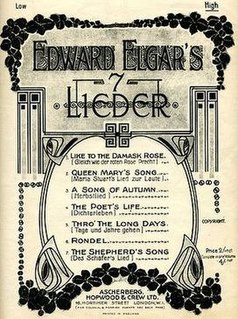The Pomp and Circumstance Marches, Op. 39, are a series of six marches for orchestra composed by Sir Edward Elgar. The first four were published between 1901 and 1907, when Elgar was in his forties; the fifth was published in 1930, a few years before his death; and the sixth, compiled posthumously from sketches, was published in 2005-2006. They include some of Elgar's best-known compositions.
Sea Pictures, Op. 37 is a song cycle by Sir Edward Elgar consisting of five songs written by various poets. It was set for contralto and orchestra, though a distinct version for piano was often performed by Elgar. Many mezzo-sopranos have sung the piece.

Sir Edward Elgar's Symphony No. 2 in E♭ major, Op. 63, was completed on 28 February 1911 and was premiered at the London Musical Festival at the Queen's Hall by the Queen's Hall Orchestra on 24 May 1911 with the composer conducting. The work, which Elgar called "the passionate pilgrimage of the soul", was his last completed symphony; the composition of his Symphony No. 3, begun in 1933, was cut short by his death in 1934.
Was it some Golden Star? is a poem written by Gilbert Parker, published in Volume I of a series of poems called Embers. It was set to music by the English composer Edward Elgar in 1910, as his Op. 59, No. 5.
Twilight is a song with music by the English composer Edward Elgar written in 1910 as his Op. 59, No. 6. Elgar set the words of the poem The Twilight of Love, from Volume 2 of a series of poems called Embers by Sir Gilbert Parker. The Opus 59 songs were part of a song-cycle of six romantic songs by Parker that was never completed – Nos 1, 2 and 4 were never composed. The other songs were Oh, soft was the song and Was it some Golden Star?. The songs were originally written with piano accompaniment, but this was later re-scored by the composer for full orchestra.
Oh, soft was the song is a song with words by Gilbert Parker set to music by the English composer Edward Elgar in 1910, as his Op. 59, No. 3. It is the second and last verse of a poem At Sea which Parker published in Volume I of a series of poems called Embers. The Opus 59 songs were part of a song-cycle of six romantic songs by Parker that was never completed – Nos 1, 2 and 4 were never composed. The other songs were Was it some Golden Star? and Twilight. The songs were originally written with piano accompaniment, but this was later re-scored by the composer for full orchestra.
"A Song of Autumn" is a poem by Adam Lindsay Gordon set to music by Edward Elgar in 1892.

In the Dawn is a song written by the English composer Edward Elgar in 1901 as his Op.41, No.1.

Speak, Music! is a song written by the English composer Edward Elgar in 1901 as his Op.41, No.2.

"The Wind at Dawn" is a poem written by Caroline Alice Roberts, and set to music by the English composer Edward Elgar in 1888.

”The Shepherd’s Song” is a song written by the English composer Edward Elgar in 1892. The words are by Barry Pain.
”Through the Long Days” is a song written by the English composer Edward Elgar in 1885 as his Op.16, No.2. The words are from a poem by the American writer and statesman John Hay.

"After" is a song written by the English composer Edward Elgar in 1895, as his Op. 31, No. 1, with the words from a poem by Philip Bourke Marston.
”There are seven that pull the thread” is a song with words by W. B. Yeats, and music written by the English composer Edward Elgar in 1901.

"A War Song", originally called "A Soldier's Song", was a poem written by C. Flavell Hayward and set to music by the English composer Edward Elgar in 1884.
"Follow the Colours" is a marching song written by the English composer Edward Elgar in 1907, with words by Capt. William de Courcy Stretton. The song is for solo voice with an optional chorus of male voices.

The Starlight Express is a children's play by Violet Pearn, based on the imaginative novel A Prisoner in Fairyland by Algernon Blackwood, with songs and incidental music written by the English composer Sir Edward Elgar in 1915.

Seven Lieder is a set of songs by the English composer Edward Elgar published together in 1907, by Ascherberg, Hopwood & Crew Ltd.

"In Moonlight" is a song with music written by the English composer Edward Elgar in 1904 to words from the poem "An Ariette for Music. To a Lady singing to her Accompaniment on the Guitar", by Percy Bysshe Shelley (1792-1822) and published in 1832.

Caroline Alice, Lady Elgar was an English author of verse and prose fiction, who married the composer Edward Elgar.











